Analysis of Micro and Macro Factors Impacting Business Ethics Globally
VerifiedAdded on 2021/02/22
|7
|1391
|47
Essay
AI Summary
This essay delves into the realm of business ethics, specifically exploring the impact of both micro and macro environmental factors on ethical practices within the global business landscape. The introduction establishes the significance of corporate social responsibility (CSR) and business ethics, emphasizing their role in sustainable development and effective organizational management. The main body of the essay examines the changing nature of business and the influence of micro-environmental factors such as competitors, customers, suppliers, shareholders, and employees. It highlights the importance of adapting to technological advancements, understanding customer needs, ensuring employee equality, and maintaining strong supplier relationships. Furthermore, the essay explores macro-environmental factors like political, economic, social, legal, and environmental influences that shape ethical business conduct. The discussion underscores the importance of ethical behavior, corporate culture, and adherence to legal and social responsibilities for building goodwill and ensuring long-term success. The conclusion summarizes the key findings, emphasizing the interplay of micro and macro factors in shaping ethical, economic, social, and environmental aspects of modern business.
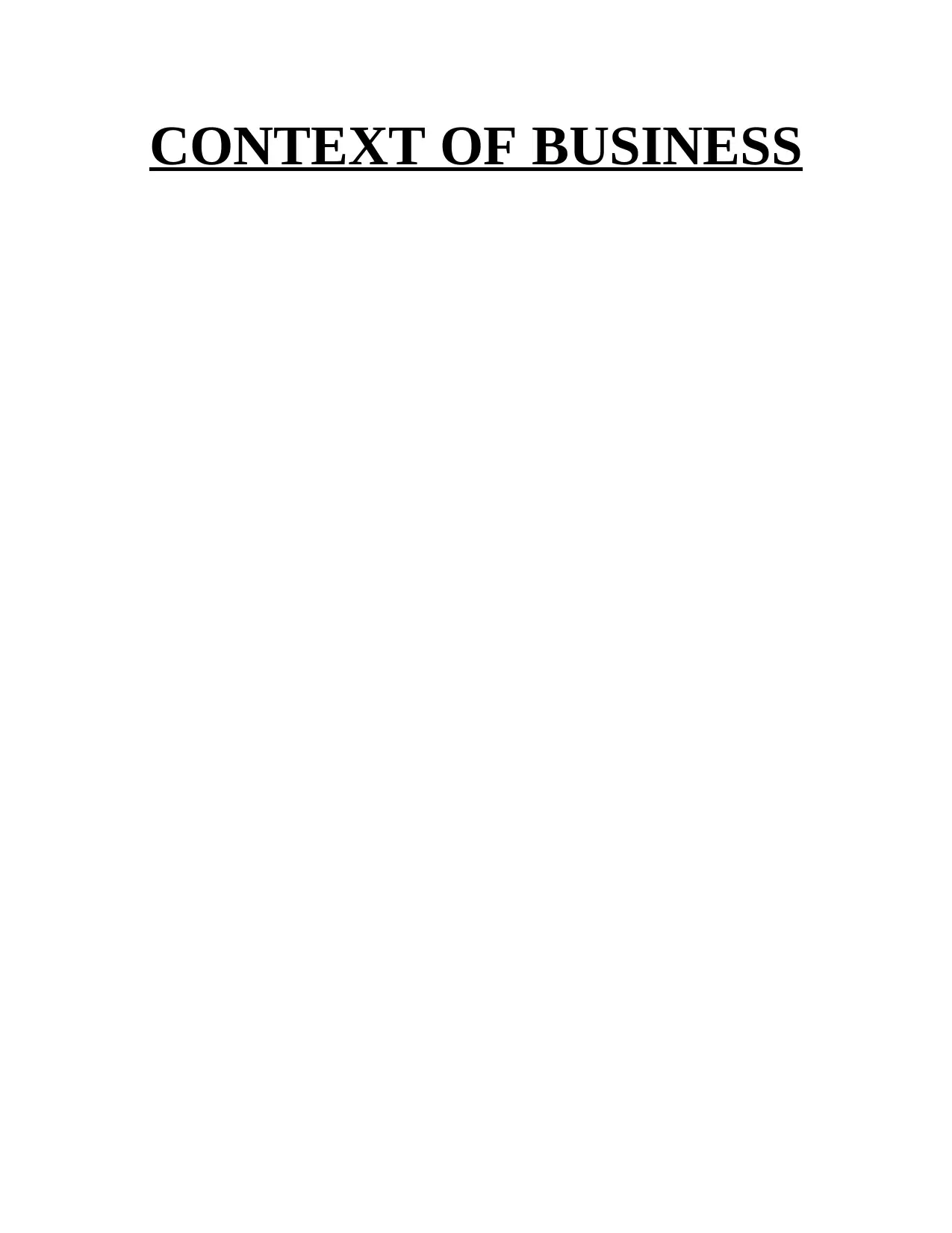
CONTEXT OF BUSINESS
Paraphrase This Document
Need a fresh take? Get an instant paraphrase of this document with our AI Paraphraser

TABLE OF CONTENTS
INTRODUCTION...........................................................................................................................3
MAIN BODY..................................................................................................................................3
CONCLUSION................................................................................................................................5
REFERENCES................................................................................................................................6
INTRODUCTION...........................................................................................................................3
MAIN BODY..................................................................................................................................3
CONCLUSION................................................................................................................................5
REFERENCES................................................................................................................................6
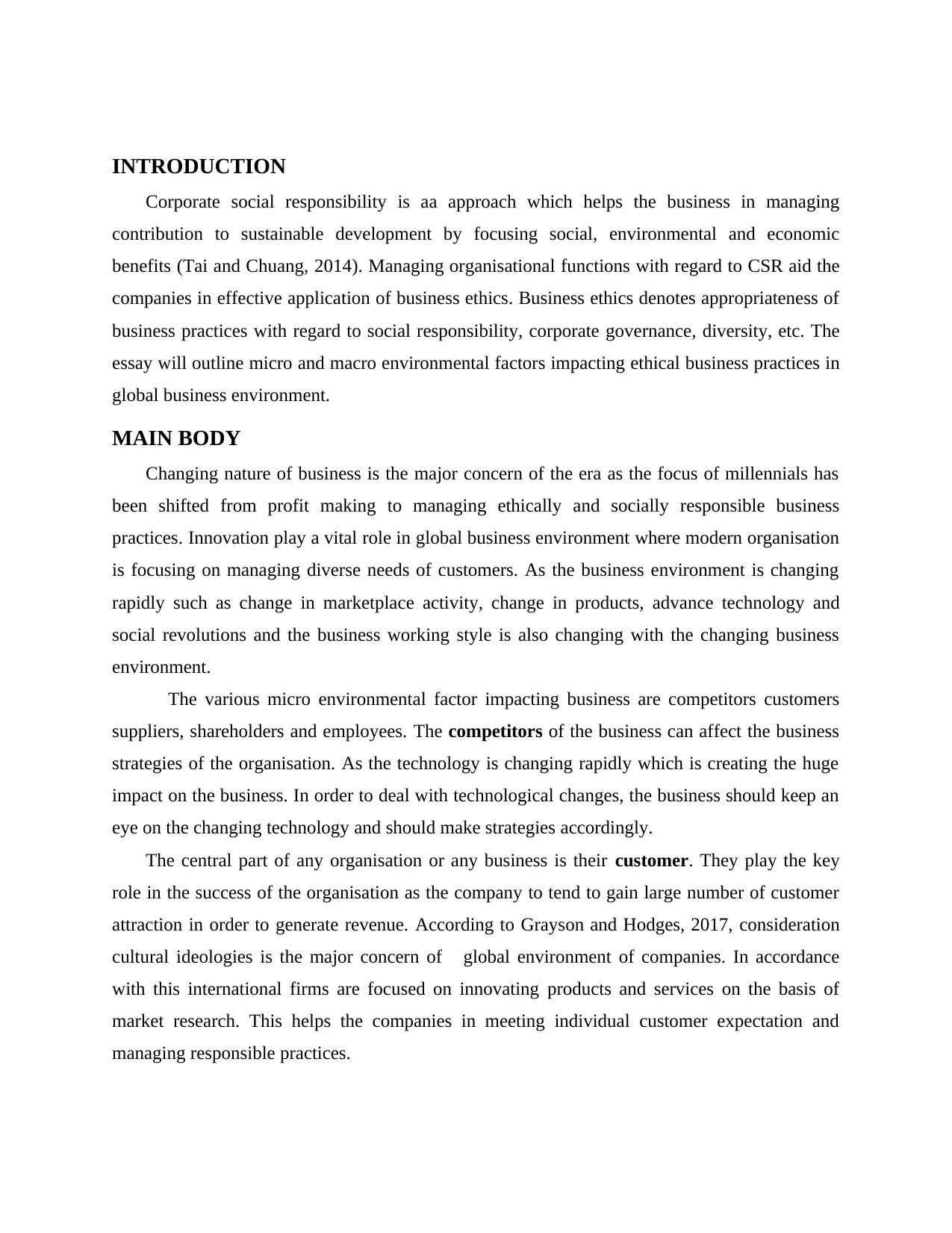
INTRODUCTION
Corporate social responsibility is aa approach which helps the business in managing
contribution to sustainable development by focusing social, environmental and economic
benefits (Tai and Chuang, 2014). Managing organisational functions with regard to CSR aid the
companies in effective application of business ethics. Business ethics denotes appropriateness of
business practices with regard to social responsibility, corporate governance, diversity, etc. The
essay will outline micro and macro environmental factors impacting ethical business practices in
global business environment.
MAIN BODY
Changing nature of business is the major concern of the era as the focus of millennials has
been shifted from profit making to managing ethically and socially responsible business
practices. Innovation play a vital role in global business environment where modern organisation
is focusing on managing diverse needs of customers. As the business environment is changing
rapidly such as change in marketplace activity, change in products, advance technology and
social revolutions and the business working style is also changing with the changing business
environment.
The various micro environmental factor impacting business are competitors customers
suppliers, shareholders and employees. The competitors of the business can affect the business
strategies of the organisation. As the technology is changing rapidly which is creating the huge
impact on the business. In order to deal with technological changes, the business should keep an
eye on the changing technology and should make strategies accordingly.
The central part of any organisation or any business is their customer. They play the key
role in the success of the organisation as the company to tend to gain large number of customer
attraction in order to generate revenue. According to Grayson and Hodges, 2017, consideration
cultural ideologies is the major concern of global environment of companies. In accordance
with this international firms are focused on innovating products and services on the basis of
market research. This helps the companies in meeting individual customer expectation and
managing responsible practices.
Corporate social responsibility is aa approach which helps the business in managing
contribution to sustainable development by focusing social, environmental and economic
benefits (Tai and Chuang, 2014). Managing organisational functions with regard to CSR aid the
companies in effective application of business ethics. Business ethics denotes appropriateness of
business practices with regard to social responsibility, corporate governance, diversity, etc. The
essay will outline micro and macro environmental factors impacting ethical business practices in
global business environment.
MAIN BODY
Changing nature of business is the major concern of the era as the focus of millennials has
been shifted from profit making to managing ethically and socially responsible business
practices. Innovation play a vital role in global business environment where modern organisation
is focusing on managing diverse needs of customers. As the business environment is changing
rapidly such as change in marketplace activity, change in products, advance technology and
social revolutions and the business working style is also changing with the changing business
environment.
The various micro environmental factor impacting business are competitors customers
suppliers, shareholders and employees. The competitors of the business can affect the business
strategies of the organisation. As the technology is changing rapidly which is creating the huge
impact on the business. In order to deal with technological changes, the business should keep an
eye on the changing technology and should make strategies accordingly.
The central part of any organisation or any business is their customer. They play the key
role in the success of the organisation as the company to tend to gain large number of customer
attraction in order to generate revenue. According to Grayson and Hodges, 2017, consideration
cultural ideologies is the major concern of global environment of companies. In accordance
with this international firms are focused on innovating products and services on the basis of
market research. This helps the companies in meeting individual customer expectation and
managing responsible practices.
⊘ This is a preview!⊘
Do you want full access?
Subscribe today to unlock all pages.

Trusted by 1+ million students worldwide
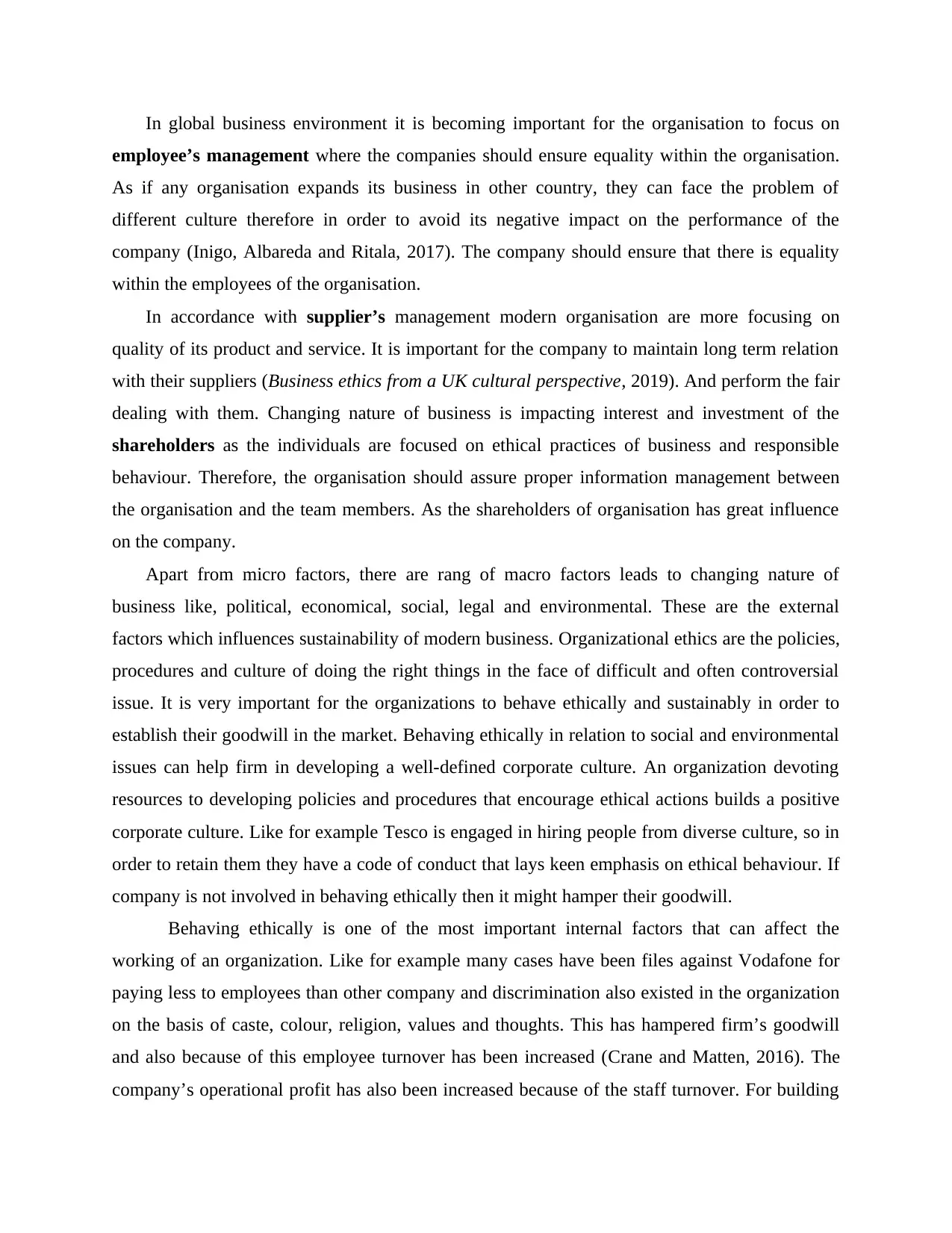
In global business environment it is becoming important for the organisation to focus on
employee’s management where the companies should ensure equality within the organisation.
As if any organisation expands its business in other country, they can face the problem of
different culture therefore in order to avoid its negative impact on the performance of the
company (Inigo, Albareda and Ritala, 2017). The company should ensure that there is equality
within the employees of the organisation.
In accordance with supplier’s management modern organisation are more focusing on
quality of its product and service. It is important for the company to maintain long term relation
with their suppliers (Business ethics from a UK cultural perspective, 2019). And perform the fair
dealing with them. Changing nature of business is impacting interest and investment of the
shareholders as the individuals are focused on ethical practices of business and responsible
behaviour. Therefore, the organisation should assure proper information management between
the organisation and the team members. As the shareholders of organisation has great influence
on the company.
Apart from micro factors, there are rang of macro factors leads to changing nature of
business like, political, economical, social, legal and environmental. These are the external
factors which influences sustainability of modern business. Organizational ethics are the policies,
procedures and culture of doing the right things in the face of difficult and often controversial
issue. It is very important for the organizations to behave ethically and sustainably in order to
establish their goodwill in the market. Behaving ethically in relation to social and environmental
issues can help firm in developing a well-defined corporate culture. An organization devoting
resources to developing policies and procedures that encourage ethical actions builds a positive
corporate culture. Like for example Tesco is engaged in hiring people from diverse culture, so in
order to retain them they have a code of conduct that lays keen emphasis on ethical behaviour. If
company is not involved in behaving ethically then it might hamper their goodwill.
Behaving ethically is one of the most important internal factors that can affect the
working of an organization. Like for example many cases have been files against Vodafone for
paying less to employees than other company and discrimination also existed in the organization
on the basis of caste, colour, religion, values and thoughts. This has hampered firm’s goodwill
and also because of this employee turnover has been increased (Crane and Matten, 2016). The
company’s operational profit has also been increased because of the staff turnover. For building
employee’s management where the companies should ensure equality within the organisation.
As if any organisation expands its business in other country, they can face the problem of
different culture therefore in order to avoid its negative impact on the performance of the
company (Inigo, Albareda and Ritala, 2017). The company should ensure that there is equality
within the employees of the organisation.
In accordance with supplier’s management modern organisation are more focusing on
quality of its product and service. It is important for the company to maintain long term relation
with their suppliers (Business ethics from a UK cultural perspective, 2019). And perform the fair
dealing with them. Changing nature of business is impacting interest and investment of the
shareholders as the individuals are focused on ethical practices of business and responsible
behaviour. Therefore, the organisation should assure proper information management between
the organisation and the team members. As the shareholders of organisation has great influence
on the company.
Apart from micro factors, there are rang of macro factors leads to changing nature of
business like, political, economical, social, legal and environmental. These are the external
factors which influences sustainability of modern business. Organizational ethics are the policies,
procedures and culture of doing the right things in the face of difficult and often controversial
issue. It is very important for the organizations to behave ethically and sustainably in order to
establish their goodwill in the market. Behaving ethically in relation to social and environmental
issues can help firm in developing a well-defined corporate culture. An organization devoting
resources to developing policies and procedures that encourage ethical actions builds a positive
corporate culture. Like for example Tesco is engaged in hiring people from diverse culture, so in
order to retain them they have a code of conduct that lays keen emphasis on ethical behaviour. If
company is not involved in behaving ethically then it might hamper their goodwill.
Behaving ethically is one of the most important internal factors that can affect the
working of an organization. Like for example many cases have been files against Vodafone for
paying less to employees than other company and discrimination also existed in the organization
on the basis of caste, colour, religion, values and thoughts. This has hampered firm’s goodwill
and also because of this employee turnover has been increased (Crane and Matten, 2016). The
company’s operational profit has also been increased because of the staff turnover. For building
Paraphrase This Document
Need a fresh take? Get an instant paraphrase of this document with our AI Paraphraser
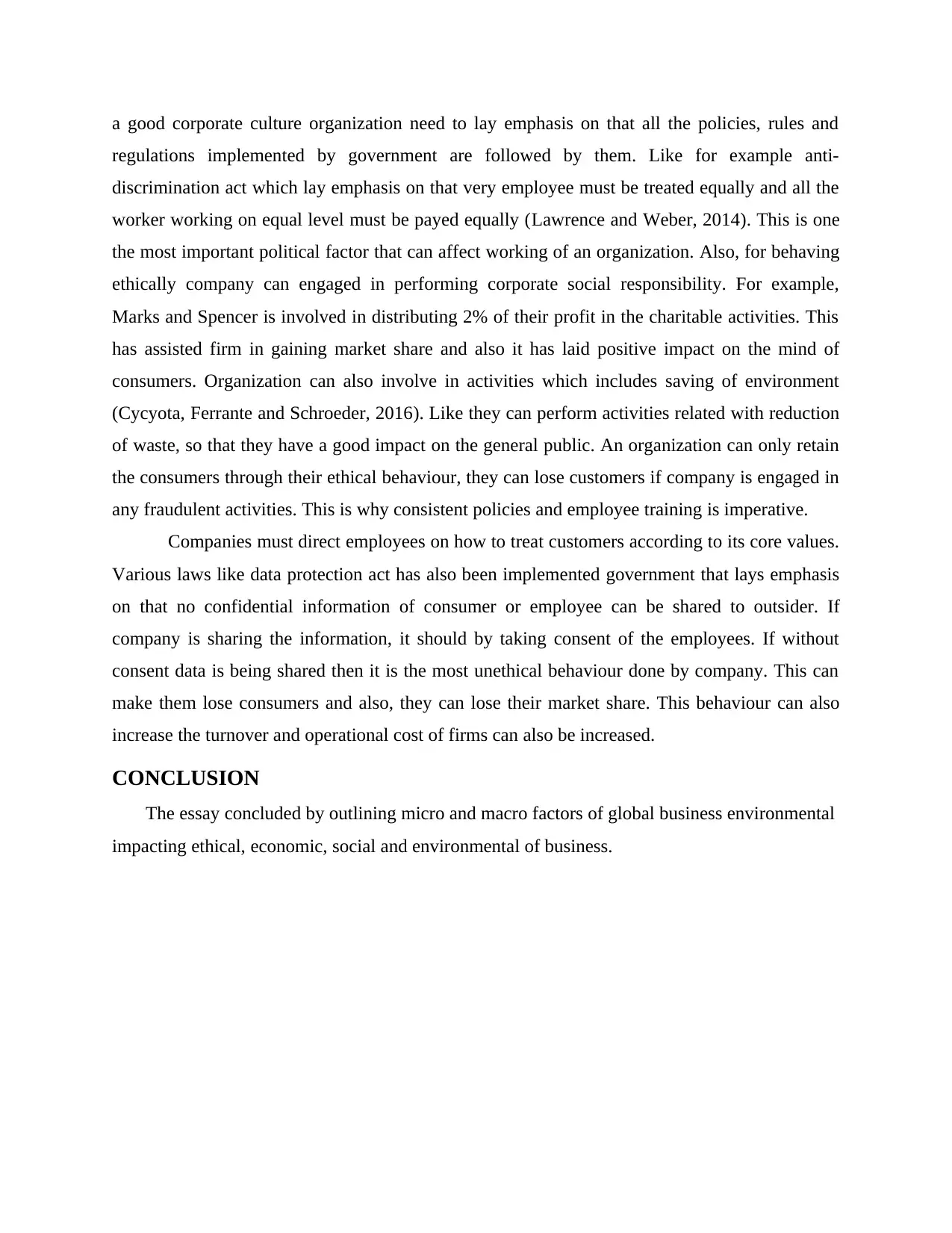
a good corporate culture organization need to lay emphasis on that all the policies, rules and
regulations implemented by government are followed by them. Like for example anti-
discrimination act which lay emphasis on that very employee must be treated equally and all the
worker working on equal level must be payed equally (Lawrence and Weber, 2014). This is one
the most important political factor that can affect working of an organization. Also, for behaving
ethically company can engaged in performing corporate social responsibility. For example,
Marks and Spencer is involved in distributing 2% of their profit in the charitable activities. This
has assisted firm in gaining market share and also it has laid positive impact on the mind of
consumers. Organization can also involve in activities which includes saving of environment
(Cycyota, Ferrante and Schroeder, 2016). Like they can perform activities related with reduction
of waste, so that they have a good impact on the general public. An organization can only retain
the consumers through their ethical behaviour, they can lose customers if company is engaged in
any fraudulent activities. This is why consistent policies and employee training is imperative.
Companies must direct employees on how to treat customers according to its core values.
Various laws like data protection act has also been implemented government that lays emphasis
on that no confidential information of consumer or employee can be shared to outsider. If
company is sharing the information, it should by taking consent of the employees. If without
consent data is being shared then it is the most unethical behaviour done by company. This can
make them lose consumers and also, they can lose their market share. This behaviour can also
increase the turnover and operational cost of firms can also be increased.
CONCLUSION
The essay concluded by outlining micro and macro factors of global business environmental
impacting ethical, economic, social and environmental of business.
regulations implemented by government are followed by them. Like for example anti-
discrimination act which lay emphasis on that very employee must be treated equally and all the
worker working on equal level must be payed equally (Lawrence and Weber, 2014). This is one
the most important political factor that can affect working of an organization. Also, for behaving
ethically company can engaged in performing corporate social responsibility. For example,
Marks and Spencer is involved in distributing 2% of their profit in the charitable activities. This
has assisted firm in gaining market share and also it has laid positive impact on the mind of
consumers. Organization can also involve in activities which includes saving of environment
(Cycyota, Ferrante and Schroeder, 2016). Like they can perform activities related with reduction
of waste, so that they have a good impact on the general public. An organization can only retain
the consumers through their ethical behaviour, they can lose customers if company is engaged in
any fraudulent activities. This is why consistent policies and employee training is imperative.
Companies must direct employees on how to treat customers according to its core values.
Various laws like data protection act has also been implemented government that lays emphasis
on that no confidential information of consumer or employee can be shared to outsider. If
company is sharing the information, it should by taking consent of the employees. If without
consent data is being shared then it is the most unethical behaviour done by company. This can
make them lose consumers and also, they can lose their market share. This behaviour can also
increase the turnover and operational cost of firms can also be increased.
CONCLUSION
The essay concluded by outlining micro and macro factors of global business environmental
impacting ethical, economic, social and environmental of business.
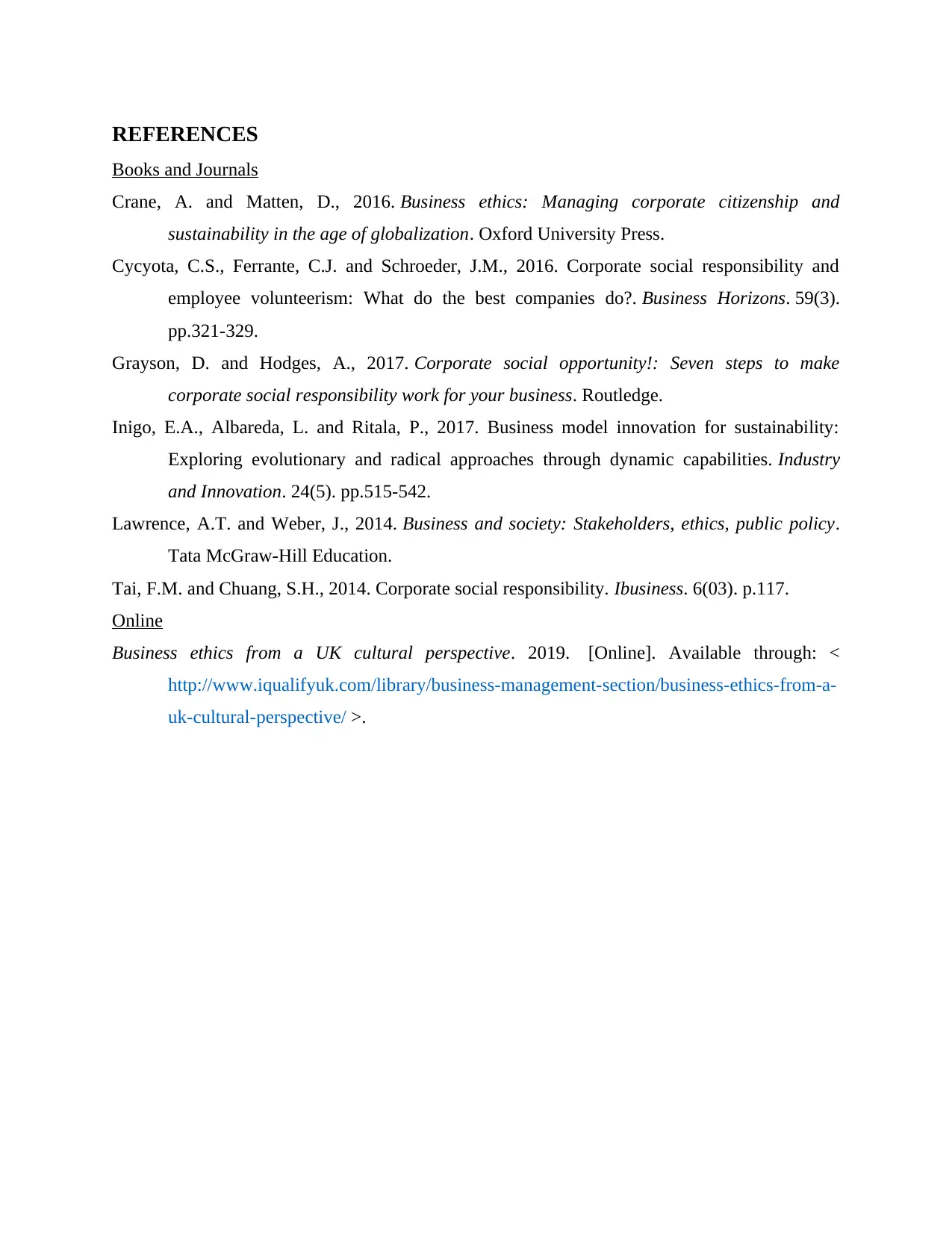
REFERENCES
Books and Journals
Crane, A. and Matten, D., 2016. Business ethics: Managing corporate citizenship and
sustainability in the age of globalization. Oxford University Press.
Cycyota, C.S., Ferrante, C.J. and Schroeder, J.M., 2016. Corporate social responsibility and
employee volunteerism: What do the best companies do?. Business Horizons. 59(3).
pp.321-329.
Grayson, D. and Hodges, A., 2017. Corporate social opportunity!: Seven steps to make
corporate social responsibility work for your business. Routledge.
Inigo, E.A., Albareda, L. and Ritala, P., 2017. Business model innovation for sustainability:
Exploring evolutionary and radical approaches through dynamic capabilities. Industry
and Innovation. 24(5). pp.515-542.
Lawrence, A.T. and Weber, J., 2014. Business and society: Stakeholders, ethics, public policy.
Tata McGraw-Hill Education.
Tai, F.M. and Chuang, S.H., 2014. Corporate social responsibility. Ibusiness. 6(03). p.117.
Online
Business ethics from a UK cultural perspective. 2019. [Online]. Available through: <
http://www.iqualifyuk.com/library/business-management-section/business-ethics-from-a-
uk-cultural-perspective/ >.
Books and Journals
Crane, A. and Matten, D., 2016. Business ethics: Managing corporate citizenship and
sustainability in the age of globalization. Oxford University Press.
Cycyota, C.S., Ferrante, C.J. and Schroeder, J.M., 2016. Corporate social responsibility and
employee volunteerism: What do the best companies do?. Business Horizons. 59(3).
pp.321-329.
Grayson, D. and Hodges, A., 2017. Corporate social opportunity!: Seven steps to make
corporate social responsibility work for your business. Routledge.
Inigo, E.A., Albareda, L. and Ritala, P., 2017. Business model innovation for sustainability:
Exploring evolutionary and radical approaches through dynamic capabilities. Industry
and Innovation. 24(5). pp.515-542.
Lawrence, A.T. and Weber, J., 2014. Business and society: Stakeholders, ethics, public policy.
Tata McGraw-Hill Education.
Tai, F.M. and Chuang, S.H., 2014. Corporate social responsibility. Ibusiness. 6(03). p.117.
Online
Business ethics from a UK cultural perspective. 2019. [Online]. Available through: <
http://www.iqualifyuk.com/library/business-management-section/business-ethics-from-a-
uk-cultural-perspective/ >.
⊘ This is a preview!⊘
Do you want full access?
Subscribe today to unlock all pages.

Trusted by 1+ million students worldwide

1
1 out of 7
Related Documents
Your All-in-One AI-Powered Toolkit for Academic Success.
+13062052269
info@desklib.com
Available 24*7 on WhatsApp / Email
![[object Object]](/_next/static/media/star-bottom.7253800d.svg)
Unlock your academic potential
Copyright © 2020–2025 A2Z Services. All Rights Reserved. Developed and managed by ZUCOL.





